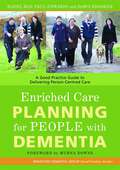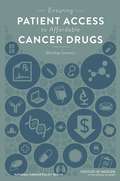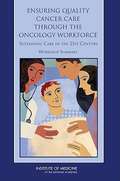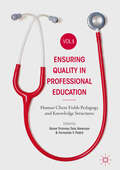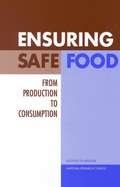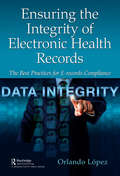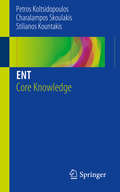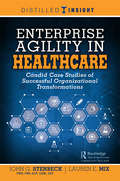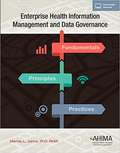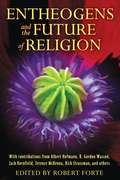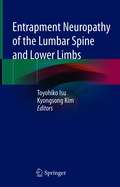- Table View
- List View
Enmascarando: Una Guía Dermatológica sobre el Maskne
by Wan Lin TeoEnmascarando - Una Guía Dermatológica sobre el Maskne, está escrito por la Dra. Teo Wan Lin, que es una de las dermatólogas más destacadas de Singapur y directora médica del TWL Specialist Skin & Laser Centre. El acné de mascarilla o “maskne” para abreviar es un nuevo término acuñado durante la pandemia de COVID-19 de 2020, más precisamente conocido como acné mecánico o acné de oclusión para los dermatólogos. Este libro está escrito como una guía del fenómeno, con cuidados de la piel, consejos de maquillaje para la “nueva costumbre” de llevar mascarilla, e información sobre cómo elegir la mascarilla de tela adecuada. La Dra. Teo dirige el desarrollo de una rama de investigación en ciencias de los materiales, Dr.TWL Biomaterials, que se centra en biomateriales novedosos y ecológicamente sostenibles para aplicaciones para la piel. Como primera empresa textil cosmecéutica dirigida por dermatólogos, la rama de biomateriales desarrolla tecnología de vanguardia para una nueva generación de tejidos biofuncionales. Es una dermatóloga pionera en el campo del desarrollo de tejidos biofuncionales. La carta de investigación original de la Dra. Teo «Consideraciones sobre el diagnóstico y el manejo de la mascarilla en la era del COVID-19» fue publicada por el Journal of the American Academy of Dermatology, clasificada como la mejor* revista de dermatología a nivel internacional, en octubre de 2020. *Las clasificaciones del factor de repercusión de 2019 publicadas por el grupo Journal Citation Reports (JCR) Web of Science.
Enriched Care Planning for People with Dementia: A Good Practice Guide to Delivering Person-Centred Care
by Paul Edwards Dawn Brooker Hazel MayThe correlation between 'disengagement' and illness in people with dementia living in long-term care settings is becoming more widely recognised, and developing and adapting front-line staff responses to the changing needs of individuals is a crucial factor in addressing this problem. This book presents a complete practical framework for whole person assessment, care planning and review of persons with dementia or signs of dementia (including those with learning disabilities) who are in need of, or already receiving, health and/or social support. The book provides photocopiable assessment forms, guidelines for carrying out the assessment, and suggestions for tailored interventions based on the profile that emerges from the assessment process. The authors also include a clear explanation of the five theoretical components of dementia that are considered in the assessment: health, biography, personality, neurological impairment and social psychology. This good practice guide will provide a step up to the challenge of providing person centred care as a minimum standard rather than just an ideal. Care workers in residential settings and social workers assessing clients for their support requirements will find this an essential resource.
Ensuring America's Health
by Christy Ford ChapinEnsuring America's Health explains why the US health care system offers world-class medical services to some patients but is also exceedingly costly with fragmented care, poor distribution, and increasingly bureaucratized processes. Based on exhaustive historical research, this work traces how public and private power merged to favor a distinctive economic model that places insurance companies at the center of the system, where they both finance and oversee medical care. Although the insurance company model was created during the 1930s, it continues to drive health care cost and quality problems today. This wide-ranging work not only evaluates the overarching political and economic framework of the medical system but also provides rich narrative detail, examining the political dramas, corporate maneuverings, and forceful personalities that created American health care as we know it. This book breaks new ground in the fields of health care history, organizational studies, and American political economy.
Ensuring Patient Access to Affordable Cancer Drugs: Workshop Summary
by Sharyl J. NassIn recent years, patients' out-of-pocket costs for cancer care have been rising rapidly. These costs include health insurance deductibles, coinsurance, and copayments for covered services, as well as services that are not covered by insurance. Many cancer patients are especially vulnerable financially because their illness and/or treatment impedes their ability to work, with some patients losing employment altogether. Even with insurance, cancer patients often experience financial hardships, such as going into debt, depleting all assets to pay for cancer treatment, and personal bankruptcy. Although many elements contribute to the cost of cancer care, one important component is the cost of new cancer drugs, which has been escalating rapidly in recent years. To explore the issue of cancer drug costs and patient access to affordable, appropriate drug therapies, the Institute of Medicine's National Cancer Policy Forum convened a workshop on ensuring patient access to affordable cancer drugs in June 2014. Affordability was considered from both individual and societal perspectives. The workshop featured discussion panels as well as invited presentations from clinicians, researchers, representatives from the health insurance and pharmaceutical industries, and patient advocates. "Ensuring Patient Access to Affordable Cancer Drugs" summarizes the presentation and discussion of the workshop.
Ensuring Quality Cancer Care
by Institute of Medicine National Research CouncilWe all want to believe that when people get cancer, they will receive medical care of the highest quality. Even as new scientific breakthroughs are announced, though, many cancer patients may be getting the wrong care, too little care, or too much care, in the form of unnecessary procedures.How close is American medicine to the ideal of quality cancer care for every person with cancer? Ensuring Quality Cancer Care provides a comprehensive picture of how cancer care is delivered in our nation, from early detection to end-of-life issues. The National Cancer Policy Board defines quality care and recommends how to monitor, measure, and extend quality care to all people with cancer. Approaches to accountability in health care are reviewed.What keeps people from getting care? The book explains how lack of medical coverage, social and economic status, patient beliefs, physician decision-making, and other factors can stand between the patient and the best possible care. The board explores how cancer care is shaped by the current focus on evidence-based medicine, the widespread adoption of managed care, where services are provided, and who provides care. Specific shortfalls in the care of breast and prostate cancer are identified. A status report on health services research is included.Ensuring Quality Cancer Care offers wide-ranging data and information in clear context. As the baby boomers approach the years when most cancer occurs, this timely volume will be of special interest to health policy makers, public and private healthcare purchasers, medical professionals, patient advocates, researchers, and people with cancer.
Ensuring Quality Cancer Care through the Oncology Workforce: Sustaining Care in the 21st Century
by Institute of MedicineThe American Society of Clinical Oncology (ASCO) predicts that by 2020, there will be an 81 percent increase in people living with or surviving cancer, but only a 14 percent increase in the number of practicing oncologists. As a result, there may be too few oncologists to meet the population's need for cancer care. To help address the challenges in overcoming this potential crisis of cancer care, the National Cancer Policy Forum of the Institute of Medicine (IOM) convened the workshop Ensuring Quality Cancer Care through the Oncology Workforce: Sustaining Care in the 21st Century in Washington, DC on October 20 and 21, 2008.
Ensuring Quality in Professional Education Volume I: Human Client Fields Pedagogy and Knowledge Structures
by Tara Newman Karen Trimmer Fernando F. PadróThis book analyses examples of quality teaching in professional education in the human client fields. The first of two volumes, the editors and contributors use case studies to illustrate the elements deemed good practice within professional education. There are many different routes towards preparing well-qualified professionals through higher education: as diverse as the professions themselves, these routes are largely determined by decisions academics make regarding content, curriculum alignment, integration of research with practice and pedagogical techniques. Including case studies from midwifery, medical, nursing and psychology degree programmes, the authors and editors unravel what good teaching in professional practice looks like in the human client fields, and how it can be achieved. This rigorous and comprehensive collection will be of interest and value to students and scholars of professional pedagogy, as well as practitioners.
Ensuring Safe Food From Production to Consumption
by Committee to Ensure Safe Food from Production to ConsumptionHow safe is our food supply? Each year the media report what appears to be growing concern related to illness caused by the food consumed by Americans. These food borne illnesses are caused by pathogenic microorganisms, pesticide residues, and food additives. Recent actions taken at the federal, state, and local levels in response to the increase in reported incidences of food borne illnesses point to the need to evaluate the food safety system in the United States. This book assesses the effectiveness of the current food safety system and provides recommendations on changes needed to ensure an effective science-based food safety system. Ensuring Safe Food discusses such important issues as:What are the primary hazards associated with the food supply? What gaps exist in the current system for ensuring a safe food supply? What effects do trends in food consumption have on food safety? What is the impact of food preparation and handling practices in the home, in food services, or in production operations on the risk of food borne illnesses? What organizational changes in responsibility or oversight could be made to increase the effectiveness of the food safety system in the United States?Current concerns associated with microbiological, chemical, and physical hazards in the food supply are discussed. The book also considers how changes in technology and food processing might introduce new risks. Recommendations are made on steps for developing a coordinated, unified system for food safety. The book also highlights areas that need additional study. Ensuring Safe Food will be important for policymakers, food trade professionals, food producers, food processors, food researchers, public health professionals, and consumers.
Ensuring Safe Foods and Medical Products Through Stronger Regulatory Systems Abroad
by Jim E. RiviereA very high portion of the seafood we eat comes from abroad, mainly from China and Southeast Asia, and most of the active ingredients in medicines we take originate in other countries. Many low- and middle-income countries have lower labor costs and fewer and less stringent environmental regulations than the United States, making them attractive places to produce food and chemical ingredients for export. Safe Foods and Medical Products Through Stronger Regulatory Systems Abroad explains that the diversity and scale of imports makes it impractical for U. S. Food and Drug Administration (FDA) border inspections to be sufficient to ensure product purity and safety, and incidents such as American deaths due to adulterated heparin imported from China propelled the problem into public awareness. The Institute of Medicine Committee on Strengthening Core Elements of Regulatory Systems in Developing Countries took up the vital task of helping the FDA to cope with the reality that so much of the food, drugs, biologics, and medical products consumed in the United States originate in countries with less-robust regulatory systems. Ensuring Safe Foods and Medical Products Through Stronger Regulatory Systems Abroad describes the ways the United States can help strengthen regulatory systems in low and middle income countries and promote cross-border partnerships - including government, industry, and academia - to foster regulatory science and build a core of regulatory professionals. This report also emphasizes an array of practical approaches to ensure sound regulatory practices in today's interconnected world.
Ensuring the Integrity of Electronic Health Records: The Best Practices for E-records Compliance
by Orlando LópezData integrity is a critical aspect to the design, implementation, and usage of any system which stores, processes, or retrieves data. The overall intent of any data integrity technique is the same: ensure data is recorded exactly as intended and, upon later retrieval, ensure the data is the same as it was when originally recorded. Any alternation to the data is then traced to the person who made the modification. The integrity of data in a patient’s electronic health record is critical to ensuring the safety of the patient. This book is relevant to production systems and quality control systems associated with the manufacture of pharmaceuticals and medical device products and updates the practical information to enable better understanding of the controls applicable to e-records. The book highlights the e-records suitability implementation and associated risk-assessed controls, and e-records handling. The book also provides updated regulatory standards from global regulatory organizations such as MHRA, Medicines and Healthcare Products Regulatory Agency (UK); FDA, Food and Drug Administration (US); National Medical Products Association (China); TGA, Therapeutic Goods Administration (Australia); SIMGP, Russia State Institute of Medicines and Good Practices; and the World Health Organization, to name a few.
Enséñales a comer para toda la vida
by Héctor Mendoza"La salud no ocurre en un consultorio médico. Se origina en el hogar y en la comunidad". Dr. Héctor Mendoza Tener una alimentación sana, variada y divertida es posible y mucho más fácil de lo quepensamos. En este libro, el reconocido pediatra Héctor Mendoza acompaña a los padres en el emocionante camino que va desde el embarazo, pasando por los primeros meses de vida del bebé, hasta el inicio de la alimentación complementaria, y les presenta así un universo lleno de posibilidades en el que el bienestar y el amor son los protagonistas. A partir del revolucionario método BLW (Baby Led Weaning) no solo los niños, sino toda lafamilia, podrán reconocer en los alimentos los mejores aliados para gozar de una vida plena y a la vez amigable con el medio ambiente.
Ent
by Petros Koltsidopoulos Charalampos Skoulakis Stilianos KountakisThis concise book summarises the basic knowledge required to be an otolaryngologist. It covers the 300 main diseases of ear, nose and throat, summarizing the main symptoms of each, the required diagnostic process and the therapeutic approach. This compact presentation of knowledge is very useful and practical. The reader can quickly access essential information on the majority of the ENT diseases. ENT: Core Knowledge is ideal for ENT residents who are preparing for Board exams, for specialists who want to refresh and update their knowledge, and for general practitioners with a special interest in ENT.
Entdecke das Riechen wieder: Warum es sich lohnt, die Welt mit der Nase wahrzunehmen
by Andreas KellerWarum es sich lohnt, die Welt mit der Nase wahrzunehmenEntdecke das Riechen wieder riecht wie alle anderen Bücher, aber nachdem Sie es gelesen haben, werden Bücher und vieles andere für Sie nicht mehr so riechen wie zuvor. Ob es bei Menschen Pheromone gibt, warum es so schwierig ist, über Gerüche zu reden, welches Tier den besten Riecher hat und warum manche Menschen den Geruch von Spargel-Urin nicht riechen können - das sind nur einige der Fragen, die der Geruchsforscher Andreas Keller in diesem Buch beantwortet. Menschen besitzen eine gute Nase, haben aber im Laufe der Evolution mehr und mehr verlernt, sie zu benutzen. Dieses Buch wird Sie überzeugen, dass Riechen nicht so mysteriös ist, wie oft angenommen, und dass es sich lohnt, die Welt wieder (auch) mit der Nase wahrzunehmen. In einem Zeitalter, das von digitalisierten Erfahrungen geprägt ist, die beliebig kopiert und für die Ewigkeit gespeichert werden können, bedeutet die flüchtige Realität eines Geruches mehr als je zuvor.
Enterprise Agility in Healthcare: Candid Case Studies of Successful Organizational Transformations
by John G. Stenbeck Lauren E. MixEnterprise Agility in Healthcare explains why agility is vital to organizational survival. It details the critical variables that only executive leaders can address in a way that ensures success. It uses the experiences of two major healthcare organizations in order to frame the situational context surrounding the variables and then explains why and how the leaders in those organizations made choices that proved to be extraordinarily successful … in the real world! The common challenge shared by healthcare, aerospace, and information-centric industries of every type is the extraordinary complexity and uncertainty driven by the enormous number of individual, yet codependent factors, whether in humans and their cellular functioning, or vehicles and the interaction of materials and environment, requiring leaders and decision-makers at every level to connect, interact, and synthesize vital, fluctuating data, typically via technology-intermediated network structures with varying content and scale. The networks may be obvious, like the organizational structure, while others are more abstract or virtual, like social networks and ecosystems Despite healthcare’s amazing success in improving the quality and average lifespan of human beings, the maximum lifespan remains unchanged at no more than 125 years. Very few healthcare organizations live for much longer, with most disappearing before reaching one-third of that lifespan. How systems, people, and culture respond as organizational size changes is a challenge and also an opportunity in scaling for any information-centric industry. This book will use the actual, real-world experiences of two, very successful healthcare organizations to provide specific, actionable insights into the principles and practices that provoke success. Because scaling plays a determinative role in the successful design of everything from airplanes to skyscrapers, its impact on how effective and efficient an organization is remains a continuous challenge. Perhaps understanding scaling is of greater urgency due to the increasingly large and complex structures required for companies, institutions and governments to continuously evolve the complex adaptive systems they have become. This book focuses on organizational expansion in healthcare. By examining two organizations with similar, yet very different growth experiences, this book demonstrates very successful, very real outcomes while offering key insights into the principles and practices that drove them.
Enterprise Health Information Management and Data Governance
by Merida L. JohnsThis book provides the fundamentals, principles, and practices for managing the data asset. Data growth rates are increasing at a phenomenal pace for most businesses. The book tackles how healthcare organizations can manage their data in this era of dramatic data explosion and growing deployment of information technologies. Healthcare organizations must understand that their sustainability and future viability relies on the quality of their data and how they manage this resource on an enterprise-wide basis. This text provides a framework and logical structure to help students understand the components of health information management in a digital era and to provide them with opportunities to develop the necessary skills for performing functions associated with these components. Provides an outline of enterprise-wide information management (EIM) for healthcare. Each chapter incorporates a case study, providing a real-world perspective to student learning and exploring the concepts and interrelationships of EIM and data governance. Students are invited to be a part of the case study through a set of activities at the end of each chapter. Advanced concepts are provided at the end of each chapter for in-depth analysis and study. Aligns with AHIMA core competencies.
Entheogens and the Future of Religion
by Robert ForteA study of the importance of psychedelic plants and drugs in religion and society.
Enticed by Her Island Billionaire: Enticed By Her Island Billionaire / Falling Again For The Single Dad (Mills And Boon Medical Ser.)
by Becky WicksTempted…By a man she can’t have!Dr. Mila Ricci is excited to visit the stunning Indonesian island where Sebastian Becker is pioneering a technique to heal scars. But he’s the exact opposite of the rich celebrity surgeon she’d been expecting—and Mila is immediately attracted to him! Wrestling his own demons, Sebastian might be sexy but he’s no superficial playboy; he craves a home and family. Things Mila feels are not for her, especially not with him…
Entitlement Politics: Medicare and Medicaid, 1995-2001 (Social Institutions And Social Change Ser.)
by David G. SmithEntitlement Politics describes partisan attempts to shrink the size of government by targeting two major federal health care entitlements. Efforts to restructure or eliminate entitlements as such, and to privatize and decentralize programs, along with more traditional attempts to amend and reform Medicare and Medicaid have radically transformed policymaking with respect to these programs. However, they have failed to achieve fundamental or lasting reform.Smith combines historical narrative and case studies with descriptions of the technical aspects and dynamics of policymaking to help the consumer understand how the process has changed, evaluate particular policies and outcomes, and anticipate future possibilities. His account intentionally goes at some length into the substance of the programs, the policies that are involved, and the views of different protagonists about the major issues in the dispute.One unhealthy consequence of politicizing Medicare and Medicaid policy has been to separate public debate from the technical and organizational realities underlying issues of cost containment or program structure. Smith considers this development unfortunate, since it leaves even informed citizens unable to evaluate the claims being made. Ironically, strife over Medicare has complicated the political and policy issues in American life. Only a serious and genuine bipartisan effort bringing forth the best efforts of both political parties--and some of the best industry leaders and policy experts in the field--is likely to achieve genuine reform. The more people and parties know about the history, politics, and policies of these programs, the better our prospects for devising workable, equitable, and lasting solutions. This volume leads the way toward that understanding.
Entitlement Spending: Our Coming Fiscal Tsunami
by David KoitzDavid Koitz clarifies misconceptions and presents the facts on the impending fiscal crisis driven by spending on Medicare, Medicaid, and Social Security. Although these programs are idolized as pillars of the nation's safety net, he shows how they are in fact the largest drivers of our looming fiscal problem. Koitz explains that, if an effective remedy is to emerge, those three programs must contribute heavily to the changes lawmakers consider and offers some policy directions for dealing with them.
Entrapment Neuropathy of the Lumbar Spine and Lower Limbs
by Toyohiko Isu Kyongsong KimThis book presents the latest information on the epidemiology, pathophysiology, diagnosis and treatment of peripheral nerve entrapment neuropathy, focusing on the lumbar spine and the lower limbs. The book is divided into three thematic sections, on para-lumbar spine disease, lower limb entrapment neuropathy, and comprehensive reviews. In addition to exploring the latest advances, it also features short essays by the Editor that provide valuable insights into the disease. Though neuropathy of the upper limbs has been studied in detail and substantial evidence is available, there are very few books on para-lumbar spine and lower limb entrapment neuropathy. Often, the symptoms are misdiagnosed as lumbar spine disease, overlooked, or treated as failed back surgery syndrome. This book provides a comprehensive overview of the disease and shares the latest findings from the last 10 years of research into its diagnosis and treatment, offering essential guidance for general clinicians, spinal surgeons and neurosurgeon who treat numbness and pain in the lower limbs and lower back. It will also benefit young doctors interested in the field, nurses, therapists and patients
Entrepreneurship Centres
by Paul Jones Gideon MaasFocusing on the role entrepreneurship centres can play within the UK and other countries; this edited volume explores the effective construction of viable and sustainable entrepreneurship centres. It questions how these Higher Education Centres contribute to enterprise and entrepreneurship curriculum enhancement, research, and support to entrepreneurs. Entrepreneurship Centres responds to the renewed focus on Higher Education Institutions to play a meaningful role in socio-economic development and the need for such centres to act as an equal component to the traditional roles of teaching and research within Universities. With case studies from the UK, Africa, Europe, and Canada, this collection contributes to the debate on whether entrepreneurship centres can and should play an important role in entrepreneurship activities within HEIs.
Entrepreneurship im Gesundheitswesen II: Geschäftsmodelle - Prozesse - Funktionen
by Mario A. Pfannstiel Christoph Rasche Patrick Da-CruzDieser Sammelband befasst sich mit den Phasen des Gründungsprozesses, dem Unternehmertum und dem Markteintritt von Produkten und Dienstleistungen im Gesundheitswesen. Unternehmensgründungen werden entscheidend beeinflusst durch die gesetzten Rahmenbedingungen und wirtschaftlichen Bedingungen in einem System. Ein tragfähiges Unternehmenskonzept ist genauso wichtig wie ein Management-, Marketing-, Finanzierungs- und Investitionsplan und eine gesicherte Investitionssumme, die in der Gründungsphase eines Unternehmens vorhanden sein muss, damit die Unternehmensgründung erfolgen kann. Die Autoren aus Wissenschaft und Praxis erläutern anhand von zahlreichen Beispielen die wesentlichen Erfolgsfaktoren für den Erfolg bei der Unternehmensgründung im Gesundheitsbereich.
Entrepreneurship im Gesundheitswesen III: Digitalisierung - Innovationen - Gesundheitsversorgung
by Mario A. Pfannstiel Christoph Rasche Patrick Da-CruzUnternehmertum im Gesundheitswesen ist geprägt durch Gründerpersönlichkeiten, die sich einbringen und durch neue Innovationen dazu beitragen, die Bedürfnisse von Kunden zu befriedigen. Die effiziente Nutzung von Ressourcen ist neben der systematischen Entwicklung von innovativen Geschäftsmodellen entscheidend für den Erfolg. Die Beiträge in diesem Sammelband beschäftigen sich mit dem Gründertum im Bereich der digitalen Transformation und der Entwicklungsphase zu einem innovativen Unternehmen im Gesundheitsmarkt. Unternehmerisches Denken von der Gründung bis zur Umsetzung und unternehmerischen Exzellenz wird analysiert und anhand von Fallbeispielen erörtert. Der Sammelband ist durch die Vielzahl an praktischen Beispielen von besonderem Interesse für Praktiker und Wissenschaftler.
Entrevista con Jeffery Khoury - Acercando la telemedicina al público
by Richard G Lowe Jr Ana Rodríguez Díaz¿Sabías que puedes realizar una consulta médica a través de tu smartphone y desde la comodidad de tu propia casa? Imagina poder hablar con un médico bien formado y con experiencia sobre cualquier tema que te preocupe y desde cualquier lugar del mundo. Gracias a un joven emprendedor llamado Jeffery Khoury, ahora puedes disponer de los consejos de un equipo de especialistas médicos sin esperas, sin tener que coger el coche y sin necesidad de exponerte a las enfermedades de otras personas. En esta entrevista, Jeffery nos cuenta cómo tuvo la revolucionaria idea de Doctor Pocket. Vio que existían personas con necesidades, que estaban enfermas y que sufrían, y decidió crear una solución que realmente les ayudase a obtener respuestas. Este joven emprendedor tuvo una idea, superó todos los obstáculos y consiguió la financiación que necesitaba para desarrollar su revolucionario y novedoso producto. Además, pudo encontrar al equipo de desarrolladores perfecto para crear su aplicación, Doctor Pocket. Una inspiradora historia que demuestra cómo el esfuerzo, la determinación y la fuerza de voluntad de este joven han ayudado a personas de todo el mundo. Haz clic en COMPRAR para conseguir tu ejemplar de esta motivadora entrevista.
Entry Level Skill Checklists for Physical Therapist Assistant Students (Core Texts for PTA Education)
by Terry LarsonA new resource to support and track student development across PTA programs, Entry-Level Skill Checklists for Physical Therapist Assistant Studentsis a visually appealing lab manual that includes entry-level PTA skills in a user-friendly, step-by-step checklist format.Written by seasoned PT and PTA instructor Dr. Terry Larson, Entry-Level Skill Checklists for Physical Therapist Assistant Studentscombines skill and evaluation measures into checklists so instructors may track their students’ progress with ease. The book is meant to follow students throughout their programs of study—from their first lab course to submission at the end of their program. Created to reflect the Commission on Accreditation in Physical Therapy Education guidelines, Entry-Level Skill Checklists for Physical Therapist Assistant Studentsis the latest entry into SLACK Books’ Core Texts for PTA Education series.What’s included in Entry-Level Skill Checklists for Physical Therapist Assistant Students: Sections on data collection and intervention Checklists following each skill stage to record and evaluate progress Checkboxes for peer evaluation and instructor assessment Comment areas for instructors to provide feedback on development of student abilities Across courses and programs, Entry-Level Skill Checklists for Physical Therapist Assistant Students will help students facilitate self-evaluation and professors gauge and document student progress in any PTA program.

